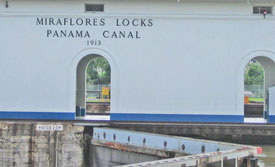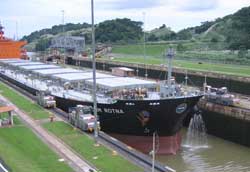 Jimmy Carter took a lot of heat in 1977 when he signed the agreement to give control of the Panama Canal to Panama. It has turned out to be one of the better decisions of his presidency. The Panama Canal is a source of enormous pride here, and its importance to the world economy has brought a great deal of prestige, not to mention money, to this small nation.
Jimmy Carter took a lot of heat in 1977 when he signed the agreement to give control of the Panama Canal to Panama. It has turned out to be one of the better decisions of his presidency. The Panama Canal is a source of enormous pride here, and its importance to the world economy has brought a great deal of prestige, not to mention money, to this small nation.
The Panama Canal is almost 100 years old, yet it is being operated today more safely and with greater shipping volumes than at any time in its long history. And on October 22, Panamanians will go to the polls to vote on a referendum to finance the construction of a 3rd lane along the canal, with locks that are deeper, longer and wider to accommodate the newest and largest of the world’s cargo ships.
There is an optimism in Panama that you don’t often see in Latin America. The economy is good, inflation is low, the government is stable, the standard of living is rising, and investment is flowing into the country. These things are due largely to the Canal, the world-class containerized freight ports Panama has built, and wise tax strategies that have encouraged the growth of new industries, such as banking.
The Panama Canal story is remarkable. The original project was begun by France in 1880. By 1893 France abandoned the work; mosquito-borne malaria was killing off the workforce at a terrible rate, and the French design — a lock-free sea-level canal — had proved too difficult to build with the technology of the day.
Theodore Roosevelt led America to restart the project in 1904. The US plan attacked the malaria problem first by paving muddy roads, building hospitals, improving sanitation and water supplies, and spraying. US engineers favored the present-day system of locks, which greatly reduced the amount of earth and rock that had to be removed, though the quantities are still staggering even by today’s standards — about 239 million cubic yards of material had to be excavated and disposed of.
 Carter’s generosity has created an inestimable amount of good will here, and has created a strong economic foundation on which Panama has successfully built.
Carter’s generosity has created an inestimable amount of good will here, and has created a strong economic foundation on which Panama has successfully built.
I wonder, if America had been wise enough to make similar investments in Mexico, if Mexicans would be flooding to the US in search of decent jobs as they are today? Our history in Mexico, at least until very recently, has been heavy on exporting resources instead of building a sustainable economy. Our involvement in Panama was quite different.
The Panama Canal is remarkable because it solves a giant problem in logistics very simply, by creating a shortcut for shipping across the isthmus of Panama. It is not a particularly high-tech system — the water that feeds the locks flows by gravity from high-elevation lakes filled by annual rains.
Because it uses fresh water and does not directly connect the Pacific with the Gulf of Mexico, there is no way for aquatic sea life to migrate through the canal from one part of the world to the other. It has created a huge fresh-water source for Panama’s population — the tap water in Panama City is safe to drink — and has provided Panama with a cheap source of hydro-electric power.
The modern buzz-phrase is “sustainable development.” In the long run, developing nations don’t benefit from sacks of food thrown off the backs of trucks. They benefit from smart, environmentally-sound economic development and improvements in clean drinking water, medical care and sanitation.
Panama is a success story. Jimmy Carter doesn’t get much respect, but on this one he turns out to have been right.


McCullough’s book on the subject (Path Between the Seas) is hefty (700 pages) but well worth reading if you enjoy engineering and human-interest stories.
It really was an amazing feat of human ingenuity and determination, not to mention great for the Panama economy.
You’ve become quite the educator;)…please continue.
You obviously have no idea that communist China is currently running both ends of the Panama Canal, where, most likely, they have stockpiled sufficient weaponry to assault both the canal zone and the United States should we ever cross them. China has long wanted an asset near the United States from which to mount an easy assault on this country should the occasion ever arise. Jackass Jimmy gave China this strike point and gave away one of the most important and useful United States assets in either hemisphere. Jimmy Carter is/was/and will continue to be the biggest fool elected to the presidency in modern times. Do not, for one moment, pretend that Jackass Jimmy’s Panama Canal giveaway will not come back to bite the United States in the future. Along with every Jimmy Carter Biography, there should be given a complimentary Chinese Language Textbook and Communist Manifesto.
I wrote two books in Spanish reference the Chinese presence in Panama, and one in Chinese. An English edition will be published shortly.
AM a Chinese of Hakka descent – the oral histories of my family say that my great grand father and his brother went to the Panama canal
sometime round 1881 and that one of them died there of malaria while the other made his money and returned to China sometime 1930 – 1940.
Surname is Tai … any info would be great!!
Am working to trace the family tree….